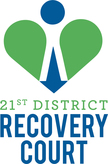Statements
Mission
The mission of the 21st District Recovery Court is to provide the 21st Judicial District a non-adversarial, cost-effective treatment alternative to traditional sentencing for non-violent offenders whose crimes result from drug or alcohol addition.
Background
The 21st District Recovery Court began planning in 2001 when two Circuit Court Judges decided that Middle Tennessee would benefit from a Recovery Court, as they had been successful in other parts of the country at drastically reducing recidivism and successfully rehabilitating repeat offenders at a fraction of the price of traditional sentencing. We received our first admissions in August 2002. Through partnerships with the D.A., the Public Defender, Law Enforcement, and the Circuit court Judges, the 21st District Recovery Court has successfully treated hundreds of offenders with drug and alcohol addictions. Participants receive specialized addiction treatment and education, prior to completing the full two-year program. The program includes random drug testing, weekly counseling, 12 Step or Self Help meetings, and requires that all participants be employed or enrolled in school. Mental Health issues are also addressed. Participants are held to a high degree of accountability and are given much needed structure in their lives. We are always looking for ways to expand our services and to one day be able to offer in-patient treatment at a residential facility to be located in Williamson County, in addition to our out-patient program. The opiate epidemic has strengthened our resolve to find resources to help participants to recover from addiction and become productive members of society.
Impact
Accomplishments: 1: Met organizational goals as to recidivism rates. 2: Participants adopted healthy, sober, and crime-free lives. 3: Participants were re-united with families and the community. 4: Participants returned to gainful employment and education. Goals: 1: To promote public safety by reducing criminal activity of Drug Court participants during participation in and after graduation from the program. a. To maintain a retention rate of Drug Court participants of at least 60% measured on an annual basis. b. To have a recidivism rate of Drug Court graduates of no more than 20% at the goal of one year following graduation. c. To have a recidivism rate of Drug Court graduates of no more than 25% at the goal of two years following graduation. 3. To eliminate use of all illegal drugs and reduce to community accepted standards, use of alcohol and other drugs by Drug Court graduates. 4. To return productive people to society. a. To have each active participant in full-time employment or education/training. b. At one year after graduation and at two years after graduation, to have at least 80% of graduates in full-time employment or education/training. c. At one year after graduation and at two years after graduation, to have at least 80% of graduates providing financial support to their families, if required. 5. To fund and obtain an independent evaluation of the 21ST Recovery Court program at least every two years.
Needs
1. $10,000 for outside contractors for family, female, and life skills counseling.
2. $30,000 - housing- we spend over $80,000 yearly for rent/utilities to lease 5 houses/apartments for participants in our program.
3. $10,000 - participant emergency needs such as medication, food, clothes, trolley passes, basic cell phones and minutes
Volunteers for office technical support.
CEO Statement
Drug and alcohol addiction numbers continue to rise as individuals try to meet the immediate need of pain relief, whether physical or emotional, through substance abuse. We want to meet those needs and assist addicted individuals in their recovery. Housing is very expensive in the area in which we reside and participants must live in this area to access resources of the two-year program.
Board Chair Statement
The challenges are always being able to have the resources to help more people. We never want to say that we cannot help someone because we do not have adequate resources. Drug Courts (Recovery Courts) work. They help to transform lives, make the communities safer and produce law abiding tax paying citizens.
Service Categories |
|
| Primary Category: | Mental Health & Crisis Intervention - Substance Abuse Dependency, Prevention & Treatment |
| Secondary Category: | Crime & Legal - Related - Rehabilitation Services for Offenders |
| Tertiary Category: | Crime & Legal - Related - Drunk Driving - Related |
Areas Served
We serve the 21st Judicial District which consists of these counties: Hickman (Centerville), Lewis (Hohenwald), Perry (Linden)and Williamson (Franklin Area)
| TN - Hickman |
| TN - Lewis |
| TN - Perry |
| TN - Williamson |

